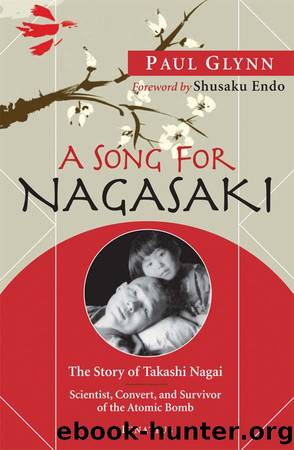A Song For Nagasaki by Fr. Paul Glynn

Author:Fr. Paul Glynn [Glynn, Fr. Paul]
Language: eng
Format: epub
Tags: Spiritual & Religion
ISBN: 9781586173432
Publisher: Ignatius Press
Published: 2009-10-16T05:00:00+00:00
17
The Machine That Turned on Its Master
His first lecture that morning was x-ray diagnosis for third-year students. He looked at them somberly and warned of difficult times ahead. They would all be involved in the war, many at the front, others as medical officers in places that would certainly be bombed. âLook, itâs a war with the American colossus and a very powerful Britain. Most of us will have close relatives among the casualties. Youâve no idea what war in China was like. War against America and Britain will be ten times worse. . . . Japan will be cut off from the international flow of medical research. We will just have to study and research all the harder.â He concluded darkly, âI feel sure that some of us in this room will be killed or maimed.â As he said that, a vivid scene flashed uninvited onto the screen of his memory. It was the childrenâs ward in Kanansho Hospital near the Yellow River, where he had taken toys and sweets from the Nagasaki Vincentians. There were children without arms or hands, and others without feet or legs. He offered them sweets, but they just stared at him dumbly. The bombing had robbed them of something more precious than limbs. When he snapped out of the reverie some moments later, his students were staring at him, shocked. As much for his own encouragement as for theirs, he quoted a favorite saying of Confucius: âIf you have found the way of truth in the morning, you can meet death peacefully that evening.â Brightening, he said: âNow letâs get down to x-ray diagnosis.â
The military government files noted that Nagai had been twice at the front, distinguishing himself under fire. Almost immediately he received orders to organize air-raid measures for the suburb of Urakami. One of the first groups he called together was the women of the eighteen Neighborhood Associations. Government propaganda had lulled most Japanese into a false sense of security, and they were stunned by his opening words: âWe may be bombed any time now. You must learn how to stop bleeding, how to carry the injured to a first-aid station. You will need courage, but above all you will need love. . . love great enough to lay down your lives for your fellow citizens!â
Nagai now turned his energies to building an underground operating theater that included an x-ray room. He had operated for days under artillery fire in China inside a makeshift underground theater, with a light strapped onto his head like a miner. When he assured the university faculty that the same could happen in Nagasaki, some smiled patronizingly.
All this unhappiness was somewhat alleviated by the birth of a daughter. Nagai and Midori called her Kayano, meaning âof the miscanthus reedâ. Miscanthus is the tall, graceful reed used to thatch houses, especially in the country. The choice of this name reveals something about Nagai that was well known to Midori. He had a passionate love of the harmonious blend of genuine folk craft with nature.
Download
This site does not store any files on its server. We only index and link to content provided by other sites. Please contact the content providers to delete copyright contents if any and email us, we'll remove relevant links or contents immediately.
Harry Potter and the Goblet Of Fire by J.K. Rowling(3046)
Unfinished: A Memoir by Priyanka Chopra Jonas(2918)
Never by Ken Follett(2881)
The Man Who Died Twice by Richard Osman(2300)
Machine Learning at Scale with H2O by Gregory Keys | David Whiting(2291)
Fairy Tale by Stephen King(2070)
Will by Will Smith(2042)
Rationality by Steven Pinker(1765)
The Storyteller by Dave Grohl(1660)
The Dawn of Everything: A New History of Humanity by David Graeber & David Wengrow(1571)
The Dark Hours by Michael Connelly(1570)
The Stranger in the Lifeboat by Mitch Albom(1532)
Cloud Cuckoo Land by Anthony Doerr(1435)
The Becoming by Nora Roberts(1331)
Friends, Lovers, and the Big Terrible Thing by Matthew Perry(1328)
New Morning Mercies: A Daily Gospel Devotional by Paul David Tripp(1325)
Crying in H Mart by Michelle Zauner(1316)
Einstein: His Life and Universe by Walter Isaacson(1315)
A Short History of War by Jeremy Black(1300)
